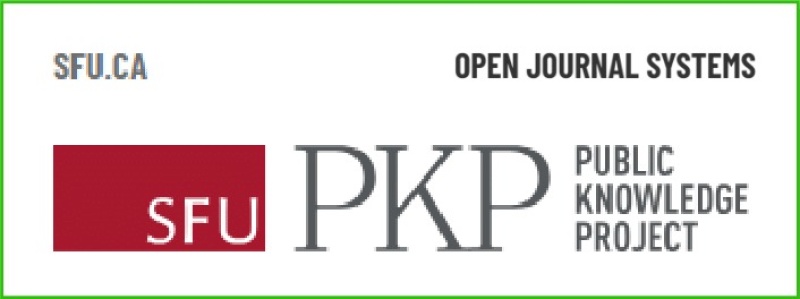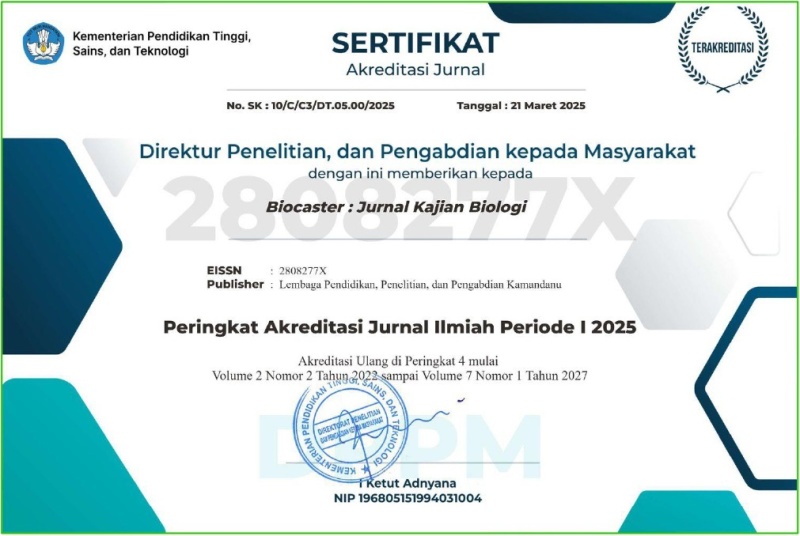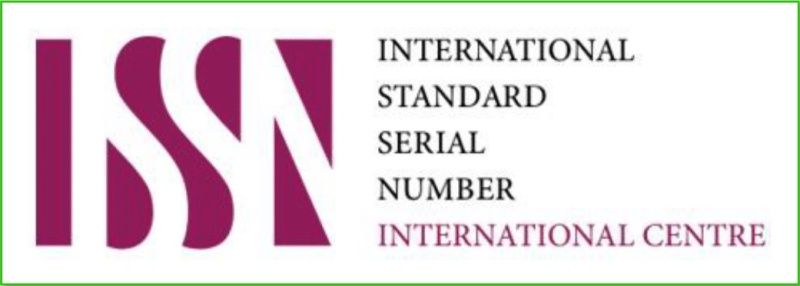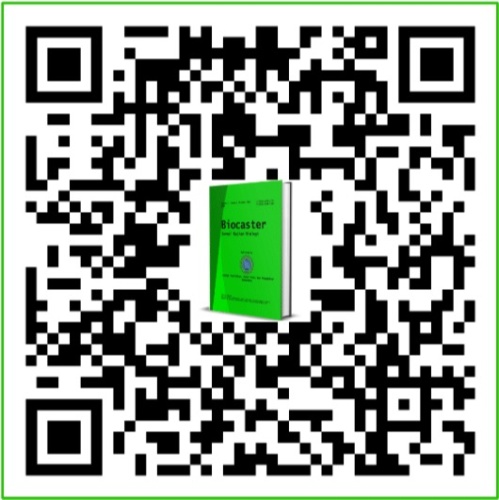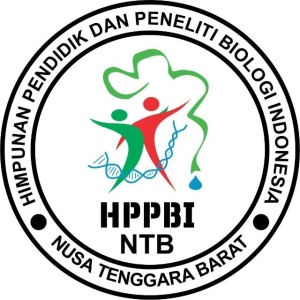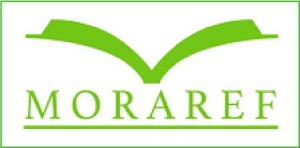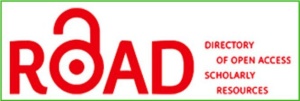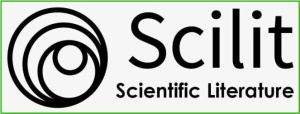Kearifan Lokal Roko Molas Poco dalam Perspektif Ekologi dan Konservasi Alam (Kajian Etnis Manggarai)
DOI:
https://doi.org/10.36312/biocaster.v5i3.490Keywords:
Ecology, Local wisdom, Nature Conservation, Manggarai, Roko Molas PocoAbstract
This study examines the Roko Molas Poco Ritual as a form of local wisdom from an ecological and nature conservation perspective. The purpose of this study is to examine in depth the ecological values in the Roko Molas Poco traditional rite. This tradition is a traditional practice that contains inherited spiritual, social, and ecological values. This study uses a qualitative descriptive approach with data collection techniques through literature studies and interviews with traditional leaders. Data are analyzed through the process of data reduction, data presentation, verification, and drawing conclusions to obtain in-depth and contextual meaning. The results show that at each stage of the Roko Molas Poco contains symbols that depict environmental ethics and traditional conservation efforts, including the selection of the main wood (siri bongkok), the Ela Racang Cola ritual, the carrying of siri bongkok, the Ela Hambor Haju ritual, and the installation of siri bongkok. The Roko Molas Poco ritual has relevance in environmental education and nature conservation, namely in learning environmental values and ethics. This ritual instills the noble values of respect, appreciation, responsibility, and an awareness of human dependence on nature as a source of life. Thus, Roko Molas Poco serves as a preventive and participatory conservation instrument. This study recommends integrating the ecological values of Roko Molas Poco into environmental education curricula and community-based environmental conservation programs.
Downloads
References
Andriyanti, M., Suwandayani, B. I., & Amelia, D. J. (2024). The Power of Integrity of Local Wisdom in Basic Education: Sustainable Development. Journal of Learning Improvement and Lesson Study, 4(2), 10-23. https://doi.org/10.24036/jlils.v4i2.110
Barizi, A., & Kosbandhono, E. (2022). Ijtihad Ekologis Pesantren dalam Upaya Konservasi Hutan dan Sumber Daya Air: Studi pada Pesantren Nurussalam Singgahan, Tuban. Jurnal Tatsqif, 21(1), 67-81. https://doi.org/10.20414/jtq.v21i1.7401
Creswell, J. W., & Creswell, J. D. (2017). Research Desigh Qualitative, Quantitative, and Mixed Methods Approaches. Los Angeles: Sage Publications.
Fauzi, M., Dewi, A. R., Arman, L., & Hadi, R. T. (2024). Empowerment of Children Based on Cultural Da’wah: A Study at Abu Bakar Ash-Shiddiq Foundation in Nagari Malai III Koto. Ilmu Dakwah : Academic Journal for Homiletic Studies, 18(1), 175-192. https://doi.org/10.15575/idajhs.v18i1.30432
Forest Watch Indonesia. (2024). Retrieved June 10, 2025, from FWI. Interactwebsite: https://fwi.or.id/hari-lingkungan-hidup-2024-degradasi-lahan/
Gabriel, N. S., Ndoen, F. A., & Prisarto, A. K. (2019). Upacara Roko Molas Poco dalam Masyarakat Suku Bangsa Manggarai di Desa Compang Laho Kecamatan Poco Ranaka Kabupaten Manggarai Timur. Jurnal Sejarah, 16(1), 1-5. https://doi.org/10.69621/jpf.v18i1.177
Gai, A. M., Arpan, Y., Satuguna, I. N. T., & Taihuttu, G. C. (2024). Revitalisasi Wisata Budaya : Merayakan Warisan dengan Sentuhan Modern (1st Ed.). Medan: PT Media Penerbit Indonesia.
Hadut, A. D., Atu, L. F., & Camnahas, A. (2023). Makna Teologi Ekologis dalam Tradisi Roko Molas Poco Ditinjau dari Perspektif Ensiklik Laudato Si’. Perspektif : Jurnal Agama dan Kebudayaan, 18(1), 55-71. https://doi.org/10.69621/jpf.v18i1.177
Hasrawaty, E., Anas, P., & Wisudo, S. (2017). Peran Kearifan Lokal Suku Bajo dalam Mendukung Pengelolaan Kawasan Konservasi di Kabupaten Wakatobi. Jurnal Penyuluhan Perikanan dan Kelautan, 11(1), 25-34. https://doi.org/10.33378/jppik.v11i1.83
Indah, D. R., & Safnowandi, S. (2018). Pemanfaatan Karbon Baggase Teraktivasi untuk Menurunkan Kadar Logam Tembaga pada Limbah Kerajinan Perak di Lombok Tengah. Hydrogen : Jurnal Kependidikan Kimia, 6(1), 65-74. https://doi.org/10.33394/hjkk.v6i1.1601
Istiawati, N. F. (2016). Pendidikan Karakter Berbasis Nilai-nilai Kearifan Lokal Adat Ammatoa dalam Menumbuhkan Karakter Konservasi. Cendekia : Jurnal Pendidikan & Pembelajaran, 10(1), 1-18. https://doi.org/10.30957/cendekia.v10i1.78
Jemali, M., Ngalu, R., & Jebarus, A. (2017). Tradisi Roko Molas Poco dalam Hubunganya dengan Penghargaan terhadap Martabat Perempuan. Jurnal Pendidikan dan Kebudayaan Missio, 9(2), 85-94.
Lon, Y. S., & Widyawati, F. (2020). Mbaru Gendang, Rumah Adat Manggarai, Flores (Eksistensi, Sejarah, dan Transformasiya). Yogyakarta: PT. Kanisius.
Miles, M. B., Huberman, A. M., & Saldana, J. (2014). Qualitative Data Analysis: A Methods Sourcebook, Edition 3. London: Sage Publications.
Naess, A. (1989). From Ecology to Ecosophy. In Rothenberg, D. (Trans.) Ecology, Community and Lifestyle: Outline of an Ecosophy. Cambridge: Cambridge University Press.
Nugraha, A. H. A., & Novianto, V. (2022). Nilai Kearifan Lokal pada Pelestarian Lingkungan Telaga Rajeng Kabupaten Brebes. Jurnal Sosialita, 17(1), 111-126.
Pingge, H. D. (2017). Kearifan Lokal dan Penerapannya di Sekolah. Jurnal Edukasi Sumba, 1(2), 128-135. http://doi.org/10.53395/jes.v1i2.27
Thamrin, H. (2019). Eco Islamic Culture : Pendekatan Sosiologi Lingkungan dalam Penyelamatan Lingkungan. Yogyakarta: Magnum Pustaka Utama.
Downloads
Published
How to Cite
Issue
Section
License
Copyright (c) 2025 Paulus Rudirudolof Ekaputra, Yulita Erlina Ngama, & Maria Waldetrudis Lidi

This work is licensed under a Creative Commons Attribution-ShareAlike 4.0 International License.
-
Attribution — You must give appropriate credit, provide a link to the license, and indicate if changes were made. You may do so in any reasonable manner, but not in any way that suggests the licensor endorses you or your use.
-
ShareAlike — If you remix, transform, or build upon the material, you must distribute your contributions under the same license as the original.


